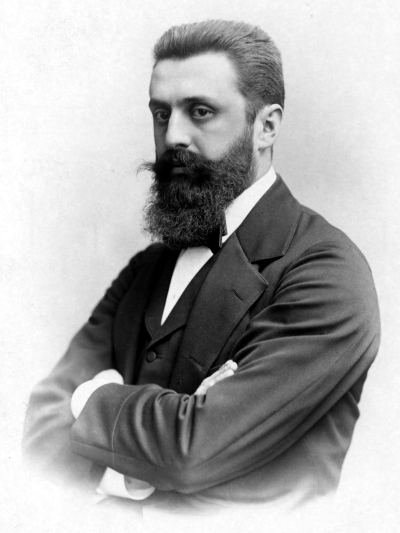Theodore Herzl
1860-1904
Founder of Modern Zionism

Theodor Herzl was born on May 2, 1860, in Pest, Hungary, into a wealthy and assimilated Jewish family. Although he initially attended a Jewish elementary school, he later enrolled in a secular high school in Pest. In 1878, his family moved to Vienna, where Herzl pursued legal studies, completing his law degree in 1884. However, rather than practicing law, Herzl chose a career in journalism. From 1891 to 1895, he served as the Paris correspondent for the influential Viennese newspaper Neue Freie Presse.
During his time in France, Herzl was deeply disturbed by the rise of French antisemitism, especially the infamous Dreyfus Affair, which he covered as a journalist. The case convinced him that antisemitism was a systemic problem that could not be resolved through assimilation. He came to believe that the only viable solution was the creation of a Jewish homeland.
After failing to persuade influential Jewish leaders, including the Rothschild family, to support his vision, Herzl turned directly to the broader Jewish public. In 1896, he published his seminal pamphlet “Der Judenstaat” (The Jewish State), in which he argued that only the establishment of a sovereign Jewish state could resolve the “Jewish question.” He maintained that political legitimacy must first be secured before mass Jewish immigration could take place.
Although Der Judenstaat was positively received by many, Herzl struggled to gain the support of the Jewish elite, especially financial backers. As a result, he shifted his strategy to mobilizing the masses. In 1897, he launched the weekly Zionist publication “Die Welt” (The World), and in August 1897, he organized the First Zionist Congress in Basel, Switzerland. This historic gathering marked the formal beginning of the Zionist movement.
From that point until his death, Herzl dedicated himself to gaining international political support for the Zionist cause. He held meetings with the Ottoman Sultan, the German Kaiser, and other world leaders in efforts to secure backing for a Jewish state, though these diplomatic efforts produced limited results. In 1903, the British government offered a proposal to establish a Jewish homeland in East Africa (Uganda), but the idea was firmly rejected by the Sixth Zionist Congress later that year.
Herzl died in Vienna on July 3, 1904, at the age of 44. In 1949, following the establishment of the State of Israel, his remains were brought to Jerusalem and reinterred on Mount Herzl, which would later become Israel’s national cemetery and a symbol of the Zionist vision he helped bring to life.
